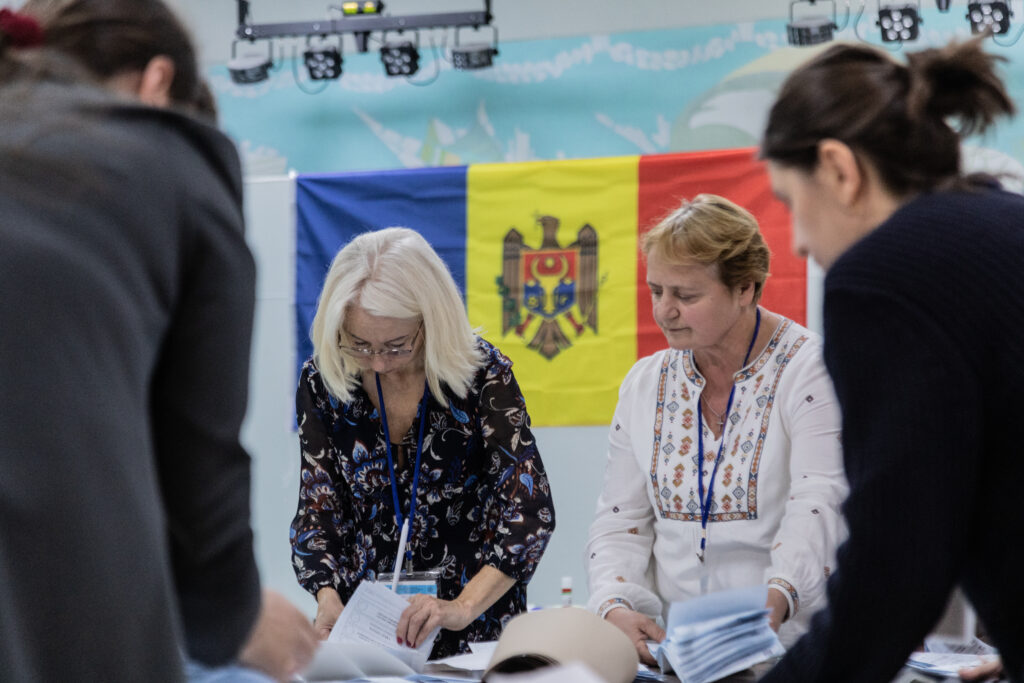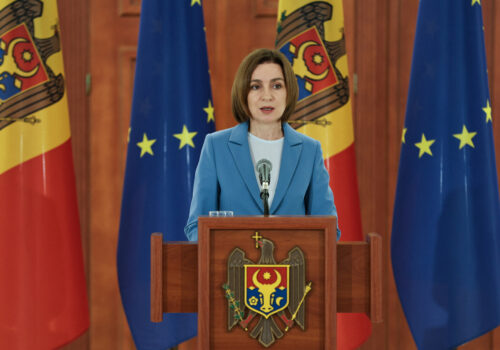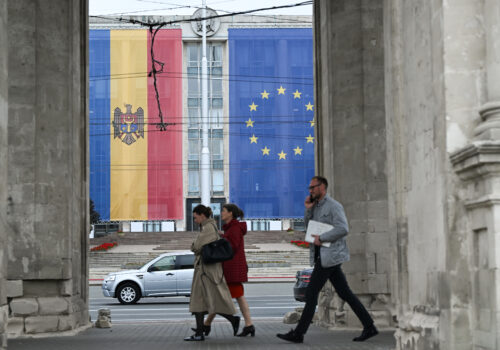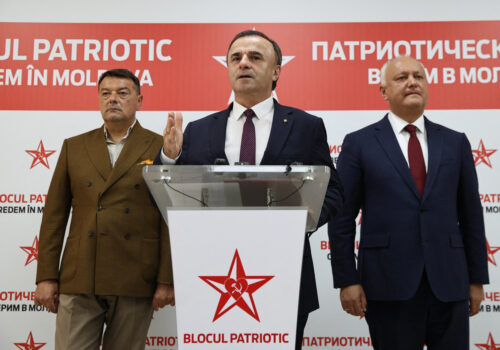History is full of examples of small but determined forces valiantly fending off aggressors. The ancient Greco-Persian wars came to my mind in late September, when tiny Moldova used superior tactics, enlightened citizen-focused leadership, and the strong support of friends and allies to successfully resist intense Russian interference in historic parliamentary elections on September 28. This was a hard-fought, high-stakes election, in which competing parties believed that the future direction of Moldova—toward the European Union (EU) or Russia—was on the ballot. I witnessed this contest on the ground in Moldova as part of an international accredited election observation mission organized by the International Republican Institute, based in Washington, DC.
When the votes were counted, Moldovan President Maia Sandu’s governing Party of Action and Solidarity (PAS), a pro-EU democratic party, won a majority of seats in parliament. With its win, the PAS defeated parties backed by Russia, which, according to Moldovan authorities, deployed intimidation tactics and an unprecedented number of resources in an attempt to disrupt Moldova’s democratic governance and halt its momentum toward EU accession. Russia’s alleged tactics included outright vote-buying, intense social media information warfare, cyberattacks, and training operatives to disrupt voting. Sandu publicly stated that Russia pumped hundreds of millions of euros—an enormous sum for a country of only 2.4 million people plus a voting diaspora of 300,000—into defeating her party.
Moldova’s September parliamentary elections had outsized geopolitical importance both because of the country’s strategic location and because of its success in strengthening ties with the West. Moldova lies along the eastern perimeter of NATO and the EU, and it borders Ukraine; its election management can be an example for its neighbor. Despite economic challenges, Russia’s substantial cutoff of gas supplies to Moldova, and Kremlin efforts to interfere in Moldova’s elections, Sandu has steadfastly maintained a pro-Europe, pro-Western political orientation.
To counter Russian interference, the PAS relied on a variety of tools and tactics—strategies that might work well in future elections for other parties and in other countries faced with a similar assault. These efforts were built around three goals:
- Build trusting relationships. Since its founding in 2016, the PAS has worked to build citizens’ trust in government institutions and democratic processes. PAS leaders listened to Moldovans as they expressed a desire for peace and broad-based economic prosperity. At the same time, the PAS built long-term relationships with partners in Western democracies and learned from their training in political party development and campaign skills. The PAS also demonstrated its commitment to EU accession by holding a successful referendum in 2024 to enshrine the country’s EU aspirations in the Moldovan constitution. In a show of support, French President Emmanuel Macron, German Chancellor Friedrich Merz, and Polish Prime Minister Donald Tusk visited with Sandu in August to commemorate Moldovan Independence Day. Long-term US engagement across several presidential administrations was also a crucial component of the PAS’s success.
- Eliminate systemic vulnerability. Since it first won a majority in parliament in July 2021, PAS has made important strides in addressing major vulnerabilities to the country. For example, Chișinău avoided a domestic energy crisis and potential political instability by moving quickly after Russia’s full-scale invasion of Ukraine in February 2022 to replace Russian gas with European energy, including new supplies from neighboring Romania. Moldova invested in cyber defense, including regulatory oversight of social media, to combat Russian disinformation. The country also cracked down on Russian efforts to foment instability ahead of the September parliamentary elections.
- Prioritize shared prosperity. During the campaign, the PAS offered Moldovans a vision of a long-term viable economic alternative to dependence on the Russian economy. Critically, this future relies on EU accession and Moldova’s ultimate integration into the EU’s economic infrastructure including in trade in goods and energy, transportation, and telecommunications.
No one should doubt that Russia will continue, and even escalate, its hybrid efforts to hijack the democratic process in other countries. But Moldova’s September parliamentary elections hold lessons for the future of the country and that of its neighbors, including Ukraine.
Moldova’s recent experience demonstrates that countries committed to democracy and European alignment can triumph at the ballot box despite Russian tactics. Sustained, multilevel support from allies is vital to that success.
Last month, US President Donald Trump posted on social media that Ukraine is “in a position to fight and WIN all of Ukraine back in its original form.” It should be added that Ukraine can also secure its democratic future, which is an important foundation for prosperity. When the war ends there will be elections in Ukraine, but even now, before the fighting stops, Kyiv should move to strengthen its democratic governance. Russia is likely to use many of the same tactics in Ukraine as it did this year in Moldova. And the elements of long-term democratic governance are unlikely to be built within the short period of a single political campaign.
Olin Wethington is a member of the International Republican Institute’s (IRI) Board of Directors and observed Moldova’s September 28, 2025, parliamentary elections as part of IRI’s accredited election observation mission.
Further reading
Mon, Sep 29, 2025
Moldova’s pro-EU ruling party won despite Russian interference. Now what?
Fast Thinking By
Moldova’s pro-Western ruling party has won a parliamentary majority. Our experts share their perspectives on what’s next for the country’s path to European Union accession.
Fri, Sep 26, 2025
Dispatch from Chișinău: Will Russia’s political pincer move put Moldova’s EU hopes in jeopardy?
New Atlanticist By John E. Herbst
Ahead of parliamentary elections in Moldova on September 28, Moscow appears to be throwing its weight behind two political parties to pull support from the party currently in power.
Mon, Sep 22, 2025
Moldova accuses Russia of election interference ahead of key vote
UkraineAlert By
Moldova is raising the alarm over Russian interference ahead of this weekend's parliamentary election amid fears that a pro-Kremlin victory could derail Moldova's EU ambitions and create a new front in Russia's invasion of Ukraine, writes Aidan Stretch.
Image: Two female election officials verify and count the ballots after polls close at the Spiru Haret Squiruminet Lyceum polling station in Chisinau during the Moldova's parliamentary election. (Nicholas Muller / SOPA Images via Reuters Connect)



